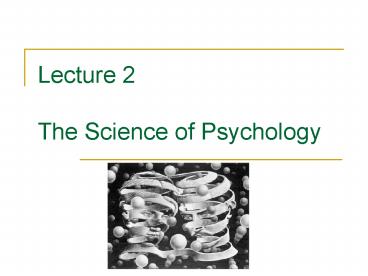Lecture 2 The Science of Psychology - PowerPoint PPT Presentation
1 / 24
Title:
Lecture 2 The Science of Psychology
Description:
People see some parts of the world and miss others. due to preconceptions, ability, attention, etc.) People notice those things that fit preconceptions ... – PowerPoint PPT presentation
Number of Views:12
Avg rating:3.0/5.0
Title: Lecture 2 The Science of Psychology
1
Lecture 2The Science of Psychology
2
Todays Outline
- Critical Thinking Science
- Psychological Methods
- Types of data
- Self report
- Observation
- Research Design
- Archival
- Correlational
- Longitudinal
- Experimental
3
Methods of PsychologyScientific Method
- Science starts with an attitude and a desire for
the truth - Systematic empirical study of phenomena
- __________ keep the bias out, include all data
and information even if it doesnt fit - __________ based on observable events
- __________ must be measurable
4
Short Video
- What was the study?
- Did people believe it?
- Whats a placebo?
- Why do placebos work?
5
Problems with Common Sense
- People see some parts of the world and miss
others - due to preconceptions, ability, attention, etc.)
- People notice those things that fit
preconceptions - People often believe to be true whatever feels
good
6
The Scientific Method
- To develop theories about the world and to test
those theories using observations - Theory An explanation
- Scientific theory is backed by data
- The scientific process
- Is self correcting (theories are tested, then
revised, then tested) - Theories are _________
- The process is objective and public
7
The Science of Psychology
- Separating anecdotes, folk wisdom and advice from
data and conclusions! - Scientific Research is
- Formulating _______________
- Testing __________ using the scientific method
- Interpreting the results
- Communicating the results --- realistically
8
The goals of science
- Description What happens?
- Prediction When does it happen?
- Explanation Why does it happen?
- Theory
- Causal Inferences
- Intervention/Application What could be done to
help? - These all build on each other
9
Self Report
- Self-report methods ask participants to tell
you - Interviews
- Questionnaires
- Daily diary methods
10
Observational Data
- Observational Data
- Observations in natural settings
- Laboratory-based observation
11
Research Designs
- Archival digging through the vaults
- Correlational research when one goes up, what
happens to the other? - Longitudinal research how do things relate over
time? - Experimental research if one is changed, what
happens to the other?
12
Archival Research
- Researchers examine existing data that may or may
not have been intended for research - Harker and Keltner (2001) used yearbook pictures
to predict marital outcomes 30 years later
13
Archival Results
- Smiling at age 20 predicted
14
Correlational Research
- Assess the naturally occurring associations among
two variables - Positive correlation
- rewards are positively associated with
satisfaction - Negative correlation
- conflicts are negatively associated with
satisfaction
15
Correlational research
The statistical concept of a correlation
coefficient (r)
16
Correlation does not imply causation!
- Three possible interpretations of any correlation
17
Pros and Cons of Correlational Research
(descriptive)
- Advantages
- Disadvantages
18
Longitudinal Research
- Data collected at 2 or more time points
- Associations among variables across time
- How are feelings of love across time associated
with divorce?
19
Longitudinal Research
- Associations among variables within a day
- How does a partners behavior during the day
influence feelings of commitment at night?
20
Pros and Cons of Longitudinal
- Advantages
- Disadvantages
21
Experimental Research
- Manipulate one variable to see if it causes
changes in another variable. - Does arousal lead to greater liking?
22
Testing the WHATs and WHYs
- 11 correspondence
- If you pour x into y, you know x caused the
explosion - If you pour x and z into y, you dont know what
caused the explosion - Random Assignment
- In large enough samples, characteristics will be
equally distributed
23
Experimental Video Games Violence
- What is an independent variable?
- What is a dependent variable?
- What is the point of experiments?
- What is random assignment?
- How are differences controlled?
24
Pros and Cons of Experimental
- Advantages
- Disadvantages































